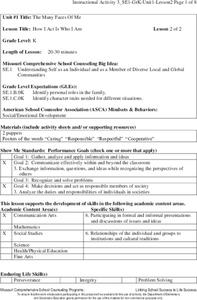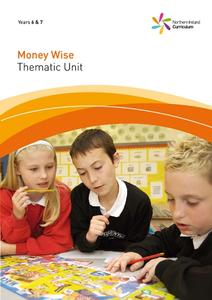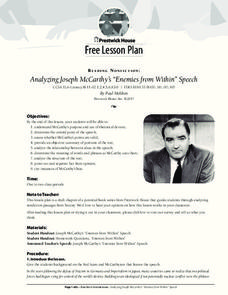American Psychological Association
Sampling or Assignment?
Each discipline has its own vocabulary, terms it uses to identify key concepts and processes. Sample, to psychologists, refers to those people (participants) a researcher is studying, while assignment refers to the treatment conditions...
US Institute of Peace
Responding to Conflict: Nonverbal Communication
What does your posture say about you? How can it affect the outcome of conflict resolution or negotiation? Show scholars the importance of nonverbal communication during the sixth in a series of 15 peacebuilding lessons. Learners work...
Read Write Think
Poetry Portfolios: Using Poetry to Teach Reading
Over the course of five periods, scholars create a poetry portfolio. They begin with a reading of the poem, Firefly. With a focus on vocabulary, learners reread the poem then look for sight words and other skills.
Time Warp Trio
See You Later, Gladiator!
Young historians take a look at the age of gladiators, and the cultural atmosphere present when they staged their epic battles. Pupils pretend to be reporters and write newspaper articles about one of the events they stage. Then,...
Civil War Trust
Gettysburg Address
The Gettysburg Address may have been four score and seven years ago, but its message is still as relevant today. Young historians explore the context of the famous speech, as well as its central theme and argument, before discussing the...
BBC
Words in the News
Here's an "old-school" lesson plan on an event in US history. High schoolers look into the massive layoffs that occurred in New Orleans in 2005. Discussion and debate take place, and groups of learners must cut and paste a series of...
Channel Islands Film
Arlington Springs Man: Lesson Plan 1
Learning to craft quality questions is a skill that can be taught. Class members use the Question Formulation Technique to learn how to create and refine both closed-ended and open-ended questions. They then view West of the West's...
BrainPOP
World History Lesson Plan: Uncovering Essential Questions
Have you ever noticed a news story revolves around an essential question? Scholars research methods of reporting historical events. Working in groups, they use an interactive module to gather information on a historical topic, uncovering...
Our White House
The Our White House Inauguration Celebration Kit for Kids!
Get the youngest American citizens involved in the presidential election and inauguration with a set of social studies activities. Focusing on the history of presidential inauguration ceremonies, learners draft their own poems, design...
Missouri Department of Elementary
How I Act Is Who I Am
A lesson centers itself around the topic of family roles. A whole-class discussion uses puppets and posters to go in-depth into the following character traits; caring, responsibility, respect, and cooperation. The discussion closes with...
US Citizenship and Immigration Services
Thanksgiving 1—Pilgrims and American Indians
The Pilgrims first arrived in America in order to gain religious freedom. Here is a instructional activity that takes the class on this journey with the Pilgrims, stopping to look at how they got here, who they met when they arrived, and...
National Endowment for the Humanities
The Beauty of Anglo-Saxon Poetry: A Prelude to Beowulf
Riddle me this! What do kennings, caesura, and alliteration have to do with the Nowell Codex? Introduce class members to Anglo-Saxon poetry and prepare readers for a study of Beowulf with a series of activities that includes asking...
Curated OER
Sign of the Beaver: Book Club Discussion
Good question are the heart of great discussions. To prepare for a book club discussion, introduce young readers to the characteristics of good conversation-starting questions. Practice crafting questions for a text the class has...
Center for Civic Education
What Basic Ideas About Government Are Included in the Preamble to the Constitution?
Young historians explore the meaning of the Preamble to the US Constitution in this upper-elementary social studies activity. Working with partners or in small groups, children discuss the purpose of government before reading and...
Northern Ireland Curriculum
Money Wise
Does money seem to slip through your middle schoolers' fingers? Encourage them to examine spending, saving, and budgeting habits with a unit on consumer skills and money management. Young spenders study the waste that occurs with school...
EngageNY
Grade 10 ELA Module 1: Unit 2, Lesson 9
Do our childhood circumstances significantly shape us? As the close reading of “The Palace Thief” continues, groups examine how the results of the first "Mr. Julius Caesar" competition influenced the development of the characters in...
Academy of American Poets
Teach This Poem: “Dead Stars” by Ada Limón
Pay attention! A lesson featuring Ada Limon's poem "Dead Stars" is designed to help learners develop their noticing skills. Class members first study the constellation Orion's image and list what they notice and how the image makes them...
Prestwick House
Reading Nonfiction: Analyzing Joseph McCarthy's "Enemies from Within" Speech
Looking for a instructional activity that teaches class members how to analyze nonfiction? Use Joseph McCarthy's famous "Enemies from Within" speech as a instructional text. Worksheet questions direct readers' attention to the many...
National Endowment for the Humanities
Chief Executives Compared: The Federalist Papers
Delve into the responsibilities of the president by looking at President Hamilton's opinion of the presidential office in his own words. The second in a three-part series, the resource also offers an interesting compare-and-contrast...
TED-Ed
How Languages Evolve
Do all languages have a common ancestor? Although no one yet knows the answer to that big question, the narrator of this short, animated video explains how linguists use migration patterns, geological features, and word clues to...
EngageNY
An Appearance of Complex Numbers 1
Complex solutions are not always simple to find. In the fourth lesson of the unit, the class extends their understanding of complex numbers in order to solve and check the solutions to a rational equation presented in the first lesson....
Roy Rosenzweig Center for History and New Media
Founding Documents
Teach the class about the predecessor to Declaration of Independence—the Virginia Declaration of Rights. Using the foundational documents, scholars examine the two writings to consider how they are similar and how they are different. A...
Curated OER
French Revolution Unit Plan
"Let them eat cake" are the famous words attributed to Marie Antoinette, but what really caused the French Revolution? The unit plan provides 20 lessons including the worksheets needed for a complete study of the French Revolution. Young...
Facing History and Ourselves
A Contested History
Memories of and interpretations of history change—that's the key takeaway from a lesson that has young historians compare the story of the Reconstruction Era as told by the historians of the Dunning School to the view of scholars today...

























